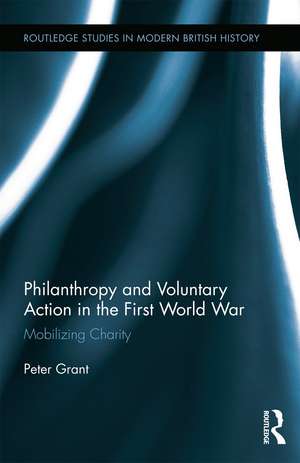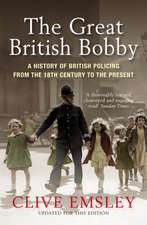Philanthropy and Voluntary Action in the First World War: Mobilizing Charity: Routledge Studies in Modern British History
Autor Peter Granten Limba Engleză Hardback – 5 mar 2014
| Toate formatele și edițiile | Preț | Express |
|---|---|---|
| Paperback (1) | 260.93 lei 6-8 săpt. | |
| Taylor & Francis – 14 oct 2024 | 260.93 lei 6-8 săpt. | |
| Hardback (1) | 823.63 lei 6-8 săpt. | |
| Taylor & Francis – 5 mar 2014 | 823.63 lei 6-8 săpt. |
Din seria Routledge Studies in Modern British History
-
 Preț: 311.91 lei
Preț: 311.91 lei -
 Preț: 325.49 lei
Preț: 325.49 lei - 9%
 Preț: 934.90 lei
Preț: 934.90 lei -
 Preț: 311.41 lei
Preț: 311.41 lei - 9%
 Preț: 1490.08 lei
Preț: 1490.08 lei -
 Preț: 311.18 lei
Preț: 311.18 lei -
 Preț: 327.47 lei
Preț: 327.47 lei -
 Preț: 334.02 lei
Preț: 334.02 lei -
 Preț: 310.88 lei
Preț: 310.88 lei -
 Preț: 311.41 lei
Preț: 311.41 lei -
 Preț: 311.41 lei
Preț: 311.41 lei -
 Preț: 311.41 lei
Preț: 311.41 lei -
 Preț: 290.15 lei
Preț: 290.15 lei -
 Preț: 286.74 lei
Preț: 286.74 lei - 18%
 Preț: 1000.27 lei
Preț: 1000.27 lei - 18%
 Preț: 999.02 lei
Preț: 999.02 lei -
 Preț: 417.60 lei
Preț: 417.60 lei - 31%
 Preț: 762.50 lei
Preț: 762.50 lei -
 Preț: 484.85 lei
Preț: 484.85 lei -
 Preț: 436.14 lei
Preț: 436.14 lei -
 Preț: 371.30 lei
Preț: 371.30 lei - 18%
 Preț: 1000.27 lei
Preț: 1000.27 lei -
 Preț: 369.73 lei
Preț: 369.73 lei - 18%
 Preț: 1003.30 lei
Preț: 1003.30 lei -
 Preț: 383.93 lei
Preț: 383.93 lei - 18%
 Preț: 1000.27 lei
Preț: 1000.27 lei - 12%
 Preț: 299.52 lei
Preț: 299.52 lei - 18%
 Preț: 1002.32 lei
Preț: 1002.32 lei -
 Preț: 410.07 lei
Preț: 410.07 lei - 26%
 Preț: 875.55 lei
Preț: 875.55 lei - 18%
 Preț: 1008.65 lei
Preț: 1008.65 lei -
 Preț: 384.48 lei
Preț: 384.48 lei - 26%
 Preț: 846.78 lei
Preț: 846.78 lei - 18%
 Preț: 1005.04 lei
Preț: 1005.04 lei - 25%
 Preț: 851.40 lei
Preț: 851.40 lei - 25%
 Preț: 771.17 lei
Preț: 771.17 lei - 25%
 Preț: 658.36 lei
Preț: 658.36 lei - 29%
 Preț: 653.49 lei
Preț: 653.49 lei - 18%
 Preț: 891.36 lei
Preț: 891.36 lei
Preț: 823.63 lei
Preț vechi: 1104.96 lei
-25% Nou
Puncte Express: 1235
Preț estimativ în valută:
157.60€ • 164.55$ • 130.43£
157.60€ • 164.55$ • 130.43£
Carte tipărită la comandă
Livrare economică 05-19 aprilie
Preluare comenzi: 021 569.72.76
Specificații
ISBN-13: 9780415704946
ISBN-10: 0415704944
Pagini: 270
Ilustrații: 18 black & white illustrations, 18 black & white tables, 17 black & white halftones, 1 black & white line drawings
Dimensiuni: 152 x 229 x 20 mm
Greutate: 0.66 kg
Ediția:New.
Editura: Taylor & Francis
Colecția Routledge
Seria Routledge Studies in Modern British History
Locul publicării:Oxford, United Kingdom
ISBN-10: 0415704944
Pagini: 270
Ilustrații: 18 black & white illustrations, 18 black & white tables, 17 black & white halftones, 1 black & white line drawings
Dimensiuni: 152 x 229 x 20 mm
Greutate: 0.66 kg
Ediția:New.
Editura: Taylor & Francis
Colecția Routledge
Seria Routledge Studies in Modern British History
Locul publicării:Oxford, United Kingdom
Public țintă
Academic and PostgraduateCuprins
1. Introduction. 2. Charity, Philanthropy and the Voluntary Sector in 1914: A "Golden Age"?. Case Study 1: Newspaper and Sporting Appeals 3. The Outbreak of War and Early Charitable Efforts. Case Study 2: "Private Tom" and Other Animals 4. Supporting Tommy: Charity Goes to War. Case Study 3: "My Good Lady, Go Home and Sit Still": Militant Women 5. The Comforts Crisis and the Director General of Voluntary Organizations. Case Study 4: Croydon War Supplies Clearing House 6. Concerns and Legislation: Scandal, Fraud and the 1916 War Charities Act. Case Study 5: Nothing Like a Book: The Camps Library 7. The Extent and Impact of War-Time Charitable Giving. Case Study 6: "The Biggest Communal Arts Project Ever Attempted": War Memorials 8. Conclusions. Afterword.
Notă biografică
Peter Grant is Senior Fellow in Grantmaking Management, Philanthropy and Social Investment at the Cass Business School, City University, London.
Recenzii
"Peter Grant has written a pioneering work. Packed with figures, interesting examples from case studies, and analysis linking wartime charities to social cohesion, Grant has shown that civil society and philanthropy were vital parts of Britain’s wartime effort."
Matthew C. Henley, State University of New York Oneonta in American Historical Review
Matthew C. Henley, State University of New York Oneonta in American Historical Review
Descriere
Non-uniformed voluntary action during the First World War continues to be a blind spot in the historiography of the war. The scale and extent of charitable activity has not yet been fully appreciated, despite amounting to well over £100 million and involving more than a million regular volunteers, many from working-class backgrounds. Drawing on extensive new primary research, this book tells the story of the volunteers and their causes, and how their actions cemented social capital in the UK. The book also examines the increasing role of the state in regulating charities during the war.









